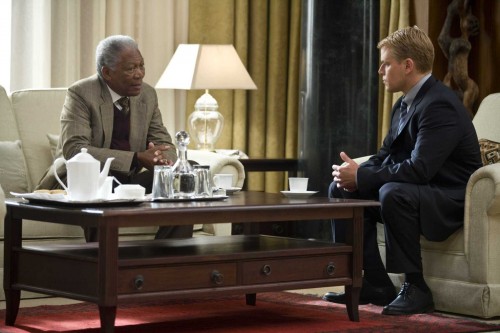Invictus
Matt Damon Has the Emotive Capacity of a Jack-o-lantern

Starring: Morgan Freeman, Matt Damon
By Robert Patrick
The furrowed brow, unyielding scowl, and gray eyes are monolithic instruments in planting the iron and steel image of Clint Eastwood’s storied legacy into the soil of cinema. The 78 year-old auteur, whose ability to craft important films from behind the camera has taken a commonplace, creates another emotional picture with historical potency and the alleged capacity for critical revelry – allegedly.
Invictus is a strange and beguiling film to watch. The plotline deals with the newly elected president of South Africa, Nelson Mandela (Morgan Freeman), sailing upon the airy cheers and emotive expressions of a country filled with rare hope. Mandela’s calm demeanor, quaintly crosshatched with his bold and fearless smile, create unbridled energy after the nation’s dark cloud of apartheid has passed. Morgan Freeman’s facial features, an eraser-mark filled composite sketch of Mandela’s bone structure, passes the grade in the casting department. Freeman recreates the pulpy, slow speaking constructs of the president’s speaking patterns, even lodging an arm or two into the sky with the same posture traits of the aforementioned Mandela. Eastwood locked in the appropriate actor to portray the charismatic and warble-voiced leader – an old buddy and a great thespian, no doubt, that he has no trouble working with.
The reemergence of a suitable leader in South Africa is the axis in which the movie spins, but the actual film is more about the 1995 South African rugby team than Mandela’s inspirational – and often painful – life. Eastwood’s attention is boldly circled over the mid-nineties world cup, in which Mandela planned to pamper and groom the members of the nation’s rugby team, no matter what the cost, in an effort to help them win the tournament. These efforts, so intensified in their planning, were to change things forever. This victory would enable, in Mandela’s mind, the country to come together, to unify.
And so you have the general synopsis.
So why do I say the film is strange and beguiling? To start with, Eastwood’s keen eye, which is usually set to sternly observe his work, seems suspiciously absent. The typical measure of detail, emotional resonance, and favorable narratives are left unattended to. Was there a stand-in director? Did the screenplay mute the abilities of such a large, cacophonous voice in cinema? Surely we’ll never know why so many peculiar failures weigh upon the fragile knees of “Invictus”, but the smoke and raining ashes of the bomb that is Eastwood’s newest film will be coming down for some time.
The screenplay, if I had to do extensive forensics, would be the leading culprit to the movie’s incurable mediocrity. When working with such interesting subject matter, as seen with the fabric of this particular history excerpt, there is no reason why Mandela and the 1995 Rugby World Cup should be trivialized or mocked by such general incompetence; the dialogue is forced, unnatural, rueful. Anthony Peckham, the hand behind the quill of this specific screen adaptation, spills more ink blotches than actual words onto the pages of poor “Invictus”. Even the leader of the rugby team, Francois Pienaar, is given a short leash in the story. Matt Damon, who portrays the unlikely hero, is restricted to a handful of lines, each paraphrasing the same sentiments of “thank you, mr. Mandela” during continuous exposes of gratitude. Damon’s presence is unnecessary – or perhaps even a distracting – when realizing his being cast into Eastwood’s film is simply for his name, and not how much he participates in the actual film.
Sullying the story’s integrity is the terrible score, hatched specifically to exploit the prospective emotional importance of the film. The companionship between composer Kyle Eastwood’s droll music and Dina Eastwood’s contrived lyrics are enough to induce nausea on the song “9000 Days” – not to mention a flurry of disapproved heads shaking. The track “Colorblind” is wholly indicative of the rainbow message that is being carried on the shoulders of “Invictus”. The lyrics in the song, however, are puzzling when considered where and how they are used in the actual film. When Mandela arrives, via helicopter, to warmly address the South African rugby team, the song’s overbearingly sentimental lyrics begin to ream the scene by actually saying, line by line, what is transpiring in the frame. And though the message is fine, I wonder if Eastwood realizes how perennially distracting and hokey it is to play such a theatrical song – especially during a moment that doesn’t require a minstrel of singers for the audience to understand what the film’s intentions are. The awkward moments of feigned emotiveness are about as subtle as, let’s say, a Hallmark card being pinned to your forehead by a staple gun.
How this source material was corrupted is beyond me. Eastwood, in directing this particular picture, almost seems to jack up a perfectly fine vehicle, replace a brand new tire with a worn and unusable one, then proceed down the road. Why cast Matt Damon if he says only a handful of nondescript lines? Why use a score so awful that the sound of a crashing grand piano sounds better? So much of this film, in scope and execution, makes for hours of enraged questioning.
1/5
